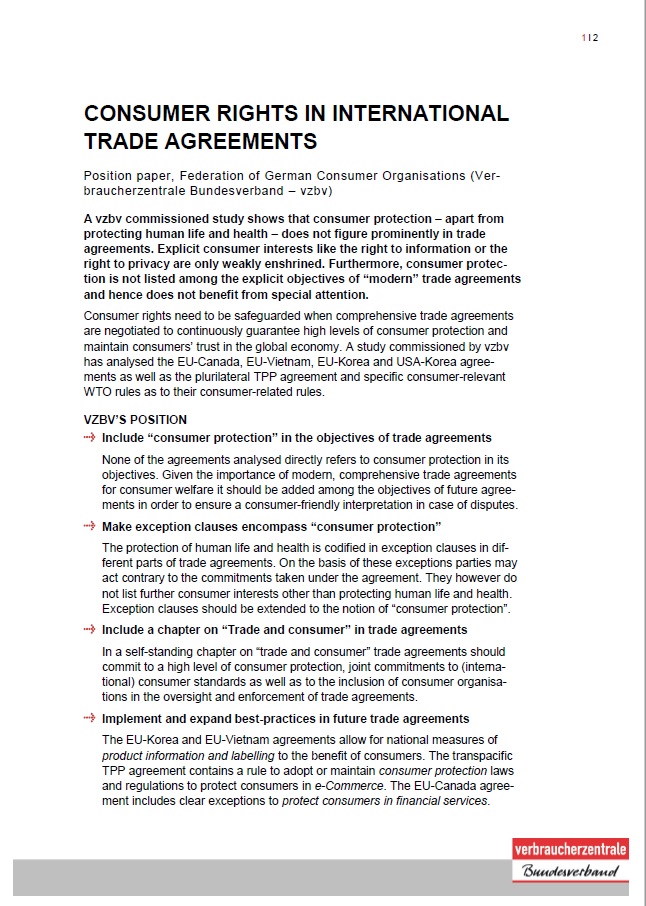In the past years, consumer organisations have worked intensively on the EU’s trade agreements with the US (TTIP) and Canada (CETA). We’ve stressed the advantages and challenges of these agreements and demanded that consumers benefit from them.
For better or for worse, TTIP negotiations are currently frozen while CETA is on its way to ratification. A good moment for us at the Federation of German Consumer Organisations (Verbraucherzentrale Bundesverband – vzbv) to reflect on how future trade agreements can work for consumers.
To find out, we analysed four trade deals: CETA, the EU’s agreements with Korea and Vietnam, the multi-country Transpacific Partnership (TPP), and the US-Korea trade agreement. This is what we uncovered…
The UN Guidelines for consumer protection
When talking about consumer rights and trade it is important to know what ‘consumer rights’ precisely are. The most common international standard in this respect is the ‘UN Guidelines for Consumer Protection’. These define protections for consumers in their interaction with businesses, and underline the importance of access to safe and high-quality products. To reflect today’s e-commerce and digital economy, the guidelines were updated in 2015.
[W]hile other public good interests like labour rights or environmental protection have their own chapter in some trade agreements, there is no such thing for consumer protection.
How do these guidelines play out in existing trade negotiations?
Lessons from existing trade agreements
What we see is only a dash of consumer rights in current trade deals. vzbv (and other consumer organisations) have often stressed that the EU-Canada (CETA) agreement is not a ‘gold standard’ for consumers. This is underlined by our study. Although its consumer protection rules on financial services are solid, other agreements have provided much more protections which are missing in CETA.
In a trade deal between Pacific countries (TPP), for example, all participating countries must have laws on protecting consumers when they shop online. The EU’s agreements with Korea and Vietnam do not see product labelling as a barrier to trade as it is an information relevant to consumers. This is quite important for the European laws on country-of-origin labelling: these cannot be deemed a trade irritant. Furthermore, the EU agreements with Vietnam and Korea state that international rules on tax evasion should be respected. This can be regarded as a first step to establish fairer market places which will ultimately also benefit consumers.
[E]xisting trade agreements seem to suggest that a sprinkling of health and safety measures constitute consumer protection as a whole.
So there are some bits and pieces of ‘best practices’ in agreements already concluded. But this also underlines that consumer interests and protections only play a tiny role in the trade context.
What role for consumer protection?
This highlights the main problem: consumer protection as such is simply not ’a thing’ in trade agreements. The UN Guidelines create a vast body of rights deemed important under the label of ‘consumer protection’. But existing trade agreements seem to suggest that a sprinkling of health and safety measures constitute consumer protection as a whole.
It is therefore no wonder that none of the studied agreements cites consumer protection as its objective. There is also nothing that ensures consumer protection measures cannot be considered as a trade barrier. And while other public good interests like labour rights or environmental protection have their own chapter in some trade agreements, there is no such thing for consumer protection.
So despite some sectoral rules that enable a consumer-friendly labelling or stronger rules on e-commerce, the link between consumer protection and trade is missing. It’s time the European Union sees the bigger picture and recognises the importance of consumer protection in and for trade.
Read the full study or the abridged position paper.
Linn Selle is the policy officer in charge of trade policy at German consumer group vzbv.


